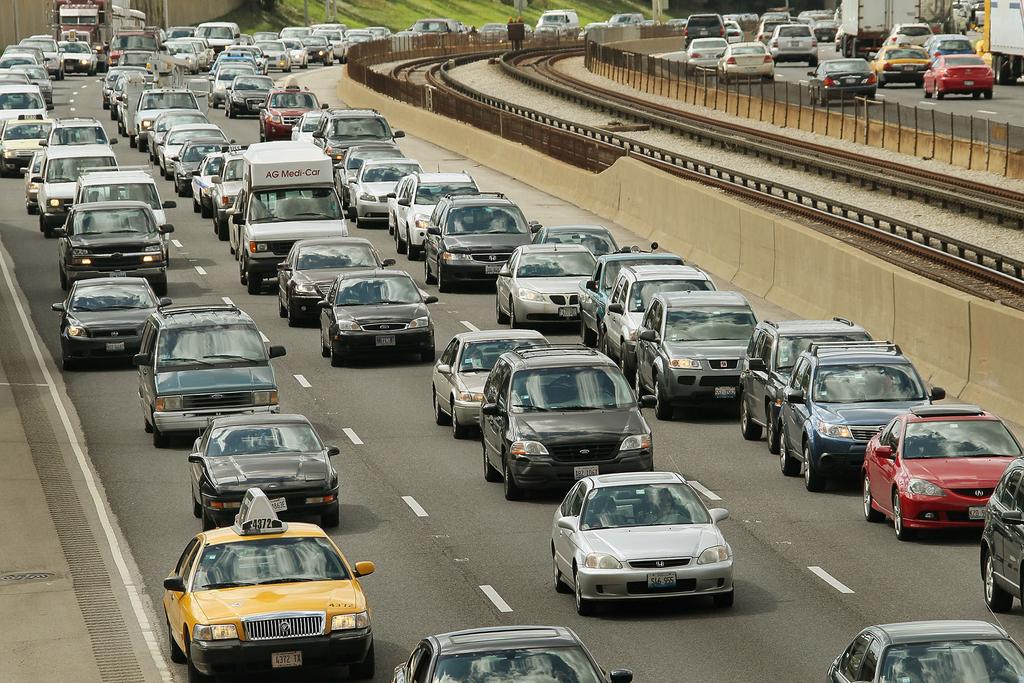
You think your commute is bad now? Just wait until 2045 when the U.S. population has swelled by a projected 70 million people. A report by the U.S. Department of Transportation examining the needs of the nation's highways over the next three decades forecasts worsening gridlock from sea to shining sea unless the country starts doing something about it now. And now is your chance to weigh in on a matter that affects every American in one way or another.
Related: Rebounding Workforce Slows Traffic on U.S. Roads
Starting today and continuing for the next few weeks, DOT is hosting a series of public forums to give citizens, civic leaders, regional transportation officials, urban planners and business communities an opportunity to get informed and provide input on the needs of the nation's highway system and what they'd like to see happen. The meetings, hosted by Transportation Secretary Anthony Foxx and other senior DOT officials, are being held in the 11 areas identified as "megaregions," where most of the population growth in the next 30 years is anticipated.
DOT defines the megaregions as "large networks of urban clusters connected by infrastructure, economic factors and social relationships." One forum will be held in each of the 11 megaregions; the process began today in Sacramento, Calif. — in the "No-Cal" megaregion — and runs through Oct. 27.
The forums will focus on the findings of DOT's "Beyond Traffic" report, released this year to start a national discussion about how the U.S. needs to shape its transportation system in order to face the issues of massive population growth, increased volume of freight trucks, demographic shifts and increasingly frequent extreme-weather events. The report, DOT said, will guide the future decision-making and policy-drafting process using data-driven analysis, research, expert opinions and public input.
"Everyone is a transportation expert of their own neighborhoods; we know our own cars, roads, bridges, transit lines, and rail lines better than anyone else," Foxx said in a statement. "So we are going to the 11 regions in this country that will experience the most explosive growth to hear directly from people in those areas about their transportation challenges, and to listen to their ideas to solve them."
Today on DOT's Fast Lane blog, Foxx talked about how most of us take our transportation system for granted until, say, a bridge crumbles or a major traffic jam occurs, and then we're reminded of how vital it is to our daily lives. He noted that the infrastructure we use today is the product of previous generations planning for the future and making the necessary investments.
"We can barely build for today, and if we're only building for the present, we're really building for the past," he wrote.
Foxx's statement echoes President Barack Obama's admonition to Congress earlier this summer for effectively putting off until fall the debate on how to cover a $16 billion shortfall in federal transportation funding, as reported by The Hill political publication. Temporary funding measures have been taken in the meantime, but only shortly before money for critical highway repairs was depleted, The Hill stated. Obama reportedly told legislators: "We can't keep on funding transportation by the seat of our pants."
Below is a schedule for the remaining "Beyond Traffic" forums:
- Phoenix, Ariz.; Sun Corridor megaregion; 9 a.m.-noon Monday at Steel Indian School Park, Memorial Hall, 300 E. Indian School Road (The event is currently full, but if you still wish to attend, the DOT said to email BeyondTraffic.dot.gov to make arrangements.)
- Long Beach, Calif.; So-Cal; Sept. 28
- Austin, Texas; Texas Triangle; Sept. 30
- Orlando, Fla.; Florida megaregion; Oct. 2
- Seattle; Cascadia; Oct. 6
- Boston; Northeast; Oct. 14
- New Orleans; Gulf Coast; Oct. 16
- Indianapolis; Great Lakes; Oct. 21
- Charleston, S.C.; Piedmont-Atlantic; Oct. 23
- Denver, Front Range; Oct. 27
No comments:
Post a Comment